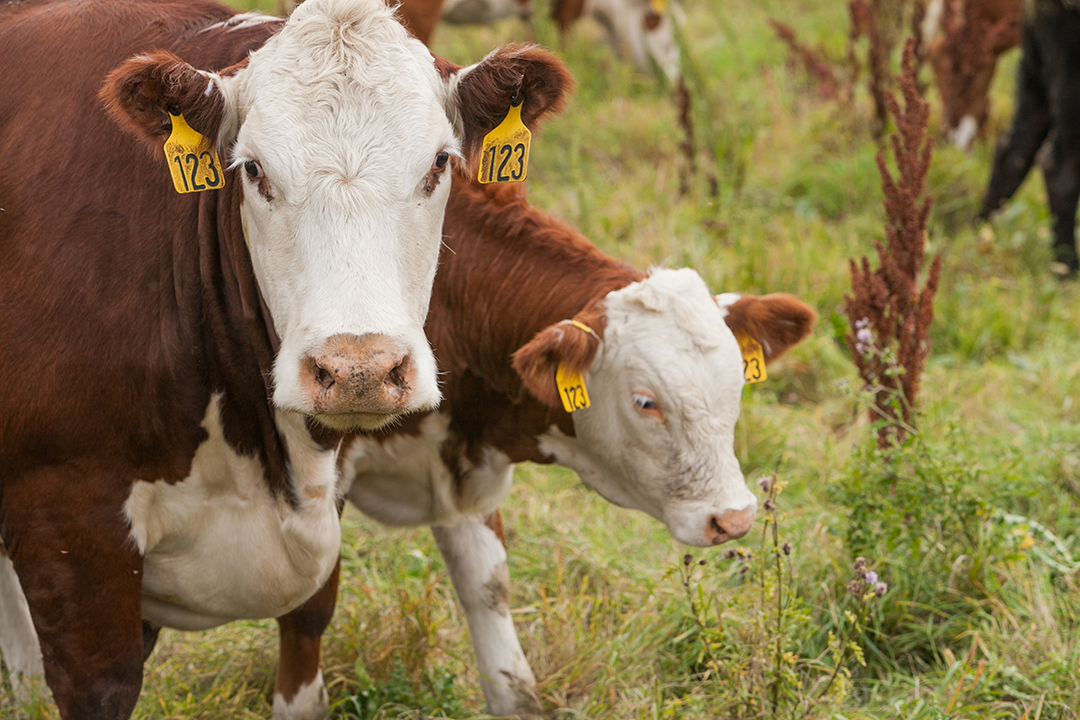
Saskatchewan invests more than $1.5 million in livestock research
Faculty and researchers based at the Western College of Veterinary Medicine (WCVM) received funding through Saskatchewan’s Agriculture Development Fund (ADF) and the Strategic Field Program (SFP) that totalled more than $1.5 million.
By WCVM TodayThe funding was announced on Jan. 17 by the federal Minister of Agriculture and Agri-Food Lawrence MacAulay and Saskatchewan Agriculture Minister David Marit. It was part of more than $5.5 million in funding for 34 livestock and forage-related research projects.
“Our government supports the growth of an innovative, competitive, and market-oriented Canadian agriculture sector,” MacAulay said. “This funding will allow for vital advancements in agricultural research that will support new discoveries in our livestock and forage industries that will benefit farmers, producers, and agribusinesses in Saskatchewan and all across the country.”
“By funding research here in Saskatchewan, we’re not only committing to the biosciences sector, we’re investing in the future of our producers and agribusinesses,” Marit said. “ADF support is granted to projects that focus on areas of concern to Saskatchewan producers, and by supporting this research we’re investing in the future of our industry.”

The following list includes projects that will be conducted by researchers who hold faculty positions at the WCVM or are based at the Vaccine and Infectious Disease Organization-International Vaccine Centre (VIDO-InterVac):
- An interactive tool to inform Johne’s disease control in beef herds: what to test, when and how often. Researcher: Dr. Cheryl Waldner, Department of Large Animal Clinical Sciences. Funding: $85,200.
- Treatment guidance for bovine respiratory disease: optimizing prudent and economical antimicrobial decisions. Researcher: Dr. John Campbell, Department of Large Animal Clinical Sciences. Funding: $348,000.
- Investigating the role of flooring in the development of toe-tip necrosis syndrome (TTNS). Researcher: Dr. Murray Jelinski, Department of Large Animal Clinical Sciences. Funding: $94,000.
- Bovine fetal sexing utilizing cell‐free fetal DNA in maternal peripheral blood. Researcher: Dr. John Campbell, Large Animal Clinical Sciences. Funding: $37,100.
- Investigating the use of a probiotic (Mycoplasma bovirhinis) to control Mycoplasma bovis infections. Researcher: Dr. Murray Jelinski, Department of Large Animal Clinical Sciences. Funding: $124,500.
- Should livestock diets be tested for the levels of the epimers of ergot alkaloids? Are these epimers biologically active? Researcher: Dr. Ahmad Al‐Dissi, Department of Veterinary Pathology. Funding: $40,000.
- Establishing protective efficacy of new Lawsonia intracellularis (ileitis) DIVA vaccine. Researcher: Dr. Heather Wilson, VIDO/Department of Veterinary Microbiology. Funding: $199,500.
- Development of improved inactivated DIVA vaccines against porcine epidemic diarrhea virus (PEDV). Researcher: Dr. Qiang Liu, VIDO/ Department of Veterinary Microbiology. Funding: $210,000.
- Ear‐tip necrosis in pigs: understanding the disease to improve welfare. Researcher: Dr. Matheus Costa, Department of Large Animal Clinical Sciences. Funding: $34,680.
- Development of a subunit vaccine to control avian reoviruses in the broiler chicken industry in Saskatchewan. Researcher: Dr. Susantha Gomis, Department of Veterinary Pathology. Funding: $150,000.
- Surveillance and improved control of American foulbrood (AFB) in honey bees in Saskatchewan. Researcher: Dr. Elemir Simko, Department of Veterinary Pathology. Funding: $195,000.
Projects funded through the ADF have gone on to create new knowledge and technologies that benefit farmers and ranchers, food processors and agribusinesses. From enhancing biosecurity, to improved vaccines, to breeding forage varieties beneficial for Saskatchewan soil, the projects supported through the ADF aim to improve Saskatchewan agriculture.
Under the Strategic Field Program, funding is available for rigorous field level demonstrations and/or the evaluation of targeted practices and technologies, which will support extension delivery while advancing the objectives of the industry. The initial project supported under this program will be confirming guidelines for beef cattle consumption of sulphate in drinking water. Scientists are conducting this research at the LFCE.
“This project is exactly the type of work the Livestock and Forage Centre of Excellence is designed to support – tackling the challenges of the agriculture sector,” said Kris Ringwall, LFCE director. “The research will provide clear and meaningful results that are science-based. Livestock producers, by incorporating the new guidelines into their operations, will be expanding their management options and, in turn, increasing the livestock sector’s revenue.”
The ADF projects supported this year will examine a variety of areas of interest to producers. The topics include developing enhanced biosecurity and animal welfare measures for livestock in transit by improving the design of the trailers they are transported in, determining if ear-tip necrosis in pigs is an infectious disease and monitoring post-fire recovery of forages on native grasslands.
Click here to read the original Government of Saskatchewan news release.
